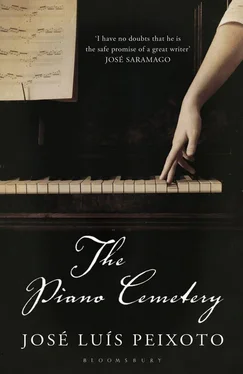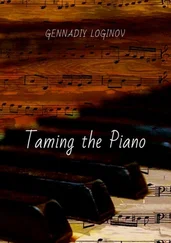of my days. She was a single world. At that time, when we were together — it was night-time and we walked the streets — I knew that my mother’s black sadness was very far away, as though it didn’t exist, the cold of the lone house was very far away, almost as though it didn’t exist. As we took these steps her voice would tell me I had the right to some peace. And we walked the streets, passing through shadows. Sometimes our elbows touched. I focused all the strength of my senses on that point where my elbow, for a moment, touched her. And in her voice, telling stories from the hospital — lads coming in the door to the emergency room, disoriented old women in the wards, broken men lying on stretchers — I could make out a slight change in tone when our elbows touched. Like me, she also felt these wordless moments that illuminated, blossomed, caught fire. At that time neither of us would have been capable of using words to speak of those moments or of the waves that washed over us. At that time we reached the door to her house and stopped, not knowing what to say or how to move. We lowered our gaze, our faces filled with shadows, and from the invisible insides of those shadows we laughed, pretending to laugh, because we didn’t know what to say or how to move. Then, to say goodbye, we would reach out a few fingers to one another. It wasn’t a handshake, it wasn’t anything, it was us reaching our arms out to one another, it was our open hands and the tips of our fingers touching in the air, as our hands began already to lower and part. Then there was a night when we kissed cheeks. I closed my eyes when my lips felt the skin of her face, the smell of inside her wavy hair. Then there were other nights. The moment wasn’t planned, the moment when I didn’t make that move I knew just how to make — that I merely had to let my neck make it — and in which our lips met. Our lips burning. My hand holding the nape of her neck — the weight and shape of her head. When our lips parted, her eyes didn’t leave mine. My eyes fleeing, and hers, serious, seeking them out. My eyes no longer able to flee — a smile. Her eyes seeing me and smiling, too. After that night, we started always walking hand in hand.
Kilometre four
from Marta’s house. No sooner had Maria opened the gate than Ana let go of her hand and went in on her own. The dogs ran round her, giving little leaps, wagging their tails and licking her. Happy, Ana shouted or laughed. Maria scolded the dogs — settle down. My mother, forgotten for a few moments, continued in her silence. Elisa came out of the front door at full tilt and ran over. She approached Ana and waited to be hugged. The dogs circled round them, high-stepping, impatient. Elisa, well-behaved, gave two little kisses to her aunt and grandmother. Ana was already heading for the door and Elisa followed her. In a straggling line, the four of them walked down the corridor. At the entrance to Marta’s room, Maria was frozen mid-word by the silence and by the sight of Marta lying in bed, in a white nightshirt, her hair falling over her face. And Ana, and Elisa behind her, ran to the crib. Ana still didn’t reach the top of the crib, so she rested her forehead against the wooden bars. When Hermes woke up my mother started walking. Maria went between the bodies of Ana and Elisa to lift him out of the crib. Moved, she said something — oh, so very tiny — and showed him to my mother. In that silence my mother felt a shapeless emptiness that was like flames tearing through her and she only cried when she took him in her arms. Innocent. Hermes looked out at the whole world and no one could imagine what his eyes saw. Marta took him from my mother’s arms. The light weakened as it came through the curtains and mingled with the shadows. All-knowing, Marta took a breast from inside her nightshirt and brought the nipple to Hermes’s little lips. And Ana remained in silence, in wonder. Elisa had already seen her mother breastfeeding her brother many times, but she too was still, she too was silent, wearing the same expression as her cousin. Maria continued to be moved. My mother remained in a silence so absolute that her body almost disappeared. That morning, Marta was already very fat. Her shoulders were thick in her nightshirt, her arms were thick, her belly was a high, round bulk under the bedclothes, her legs were thick. On that morning, and in everything that was known at the time, it was impossible to imagine that Marta would continue to get fatter to the size she is today, to the size she was the night before I left when I went over to say goodbye. Be careful out there with abroad, she said. Hermes wanted to play. Leave your uncle be, she said. When it was time to go back to the station and wait for the train, I opened my arms out wide to try and encircle her and the most I could do was rest my wrists on each shoulder. But that morning no one thought of this and everyone — even my mother — paid attention to the suckling boy. It was a gentle time. The morning
and I love you almost too much
at the foot of the walls. This perpetual sun comes in, lighting up every corner, this breeze reminds me of when I was small and my father took me to the fishmarket and showed me the blocks of ice which the men arranged on the crates of fish. It is as if, in this perpetual sun that’s burning skin and walls, there exist veins that are made of this ice. It was almost eleven o’clock at night and it was still day. These waters freeze over in the winter. It’s Sweden. My teammate wasn’t kidding me, in spite of having laughed when I looked at the dinner cutlery not knowing what to do, and in spite of having laughed as I practised holding tight on to the cutlery, and having laughed again when he said, ‘Good old Lázaro.’
the morning. I was looking at a wooden lath, my hands feeling its shape — the angles, the lines — but I didn’t see it, and I didn’t feel it, really. Time dissolved into the light, but I ignored time and the only true light was that which lit up her face within my memory — her walking beside me, her voice, her standing at the door to her house, her silences — her thin arms reaching out, her hands, her belly under a cardigan, her breasts, her legs below the end of her skirt — the serene certainties of her face — her before a kiss — her lips — voice and silence. I might have been looking at a piece of wood when the lady came in. Her little thin body, dressed in black, appeared at the door to the carpentry shop unannounced. That was the moment I lifted my head to see her approaching me — her face contented and casual, her steps on the sawdust that covered the floor. I walked over to her and before saying anything else apologised for the sawdust, for the dust and for something else I didn’t know what. It was a lady with a gold pin, with polished shoes and who looked at me, contented, almost as though she was smiling. A lady who was
Kilometre five
distinguished. Never, not even when my father was alive, had I seen such a distinguished lady come into the workshop. Without having heard her voice I already thought her face friendly — the wrinkled skin, white hair, hat with a black tulle brim behind it. Her voice was friendly. As though pleasantly making a statement, she asked me if I repaired pianos. I could only reply yes. Then I was already taking the pencil from behind my ear and making a note of her address on a small bit of board I picked up off the floor. I’d go by the following day. The lady’s smile made me smile, too. I stayed there, watching her move away towards the exit. The sounds of the city returned to the open windows. The morning returned. The image of the lady — her friendliness — remained, slowly dissolving and I only thought about her again when, the next day, I went along
am trying to remember the happiest moments, I always end up seeing the vague image in my memory of a Sunday lunch. The diffuse clarity of the light. My mother possibly plucking a chicken. The smell of boiling water poured over the chicken’s body. My mother, in the yard, sitting at a basin, in a shadow. The noise of the feathers being yanked out in fistfuls by my mother. It was always spring. It was always May. Maria might be hiding in her room, inventing fantasies, reading romance novels under the shade of the shutters; or she might be helping my mother; or she might be standing in the yard, absorbed, listening to the long tale my mother was telling in every detail as she plucked a chicken. There were birds that suddenly rose up in flight from the orange trees in the yard and which awoke a rustling of leaves. Simão came up the streets with an empty bottle in his hand, he went into the taberna and didn’t need to say anything. The man reached out his arm over the marble countertop. My brother held the bottle out to him. The marble was colder than the shade. And my brother waited as the man fitted the funnel into the neck of the bottle and as the noise of the wine that flowed from the barrel sounded alone in the empty taberna . He opened the palm of his hand where he held the sweaty coin and walked the path back home. Alongside the wall, his face was serious as he walked. His left eye fixed on a point that didn’t exist, and which was ahead of him. He made his way forwards, drawn by this. On the right side of his face, his eyelid rested over the empty socket. The lid sunk into the smooth hole that linked his cheek to his eyebrow. A black hand squeezes my heart. My breast
Читать дальше












